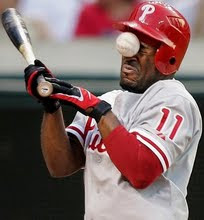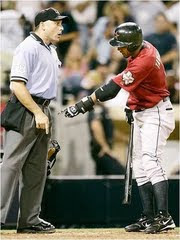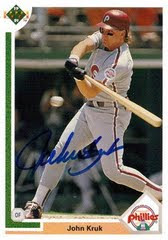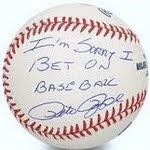There's a widely held belief that closers on crappy teams are often better candidates in fantasy baseball because they will have more opportunities to close games. The logic is that even the worst baseball teams will win at least 65-70 games and considering the teams these closers are on are so bad, at least half of those games will be won by three runs or less- giving the closer on the crappy team many opportunities to get save opportunities and saves.
Well I don't buy it.
I wish I was smarter so I can do regression analysis or some mathematical formula to prove or disprove this theory, but sadly I can not. However, what I can do is present empirical data to help prove my point.
Personally, I am under the belief that closers will nail down saves based upon how talented and healthy they are- independent of how talented the other 24 men on their roster are. If you are healthy all season then that presents more opportunities you can get to save games and if you are talented enough you will not only have the skill to not allow runs (and thus get a save) but the chance another bullpen pitcher on your team will become the team's closer will decrease.
Here's a list of guys who were top ten in saves from the past three years.
A quick explanation of the organization of this list. The first number represents how many saves the closer got. The number in "[]" represents how many save opportunities the closer got and the number in "()" after the pitcher's name represents how many wins his team got.
2010
1) 48 [53]- Brian Wilson (92)
2) 47 [50]- Heath Bell (90)
3) 45 [48]- Rafeal Soriano (96)
4) 43 [46]- Joakim Soria (67)
5) 42 [49]- Matt Capps (multiple teams)
6) 40 [41]- Fransisco Cordero (91)
7) 40 [43]- Neftali Feliz (90)
8) 38 [43]- Carlos Marmol (75)
9) 37 [44]- Billy Wagner (91)
10) 37 [44]- Jonathan Papelbon (89)
11) 37 [43]- Kevin Gregg (66)
2009
1) 48 [55]- Brian Fuentes (97)
2) 47 [52]- Joe Nathan (87)
3) 44 [46]- Mariano Rivera (103)
4) 42 [48]- Heath Bell (75)
5) 39 [43]- Fransisco Cordero (78)
6) 38 [43]- Ryan Franklin (91)
7) 38 [41]- Jonathan Papelbon (95)
8) 38 [42]- David Aardsma (85)
9) 38 [45]- Brian Wilson (88)
10) 37 [41]- Trevor Hoffman (80)
2008
1) 62 [69]- Fransisco Rodriguez (100)
2) 44 [51]- Jose Valverde (86)
3) 42 [45]- Joakim Soria (75)
4) 41 [41]- Brad Lidge (92)
5) 41 [46]- Jonathan Papelbon (95)
6) 41 [47]- Brian Wilson (72)
7) 39 [45]- Joe Nathan (88)
8) 39 [40]- Mariano Rivera (89)
9) 34 [40]- Kerry Wood (97)
10) 34 [40]- Fransisco Cordero (74)
Let's break this down even further and gather some fun analysis from this. Out of the 30 closers (although 31 closers were mentioned, I am not including Matt Capps'2010 numbers because he was traded from one of baseball's worst teams to a division winner):
- 73.3% of closers were on a team who finished above .500 (22)
- 26.7% of closers were on a team who finished below .500 (8)
- 46.7% of closers were on a team who finished with 90 wins or more (14)
- 53.3% of closers were on a team who finished with 89 wins or less (16)
- 46.7% of closers were on a team who made it to the playoffs (14)
- 53.3% of closers were on a team who did not make it to the playoffs (16)
At least in recent years, there seems to be no evidence that in order for a closer to rack up the saves, he needs to be on a team that does not get many wins.
The best indicator of closers to become top ten in saves seems to be that their team needs to win at least 82 games. Only eight times was a closer top ten in saves yet his team was under .500 (twice for Joakim Soria and twice for Fransisco Cordero)
When you break the teams even further away from the crappy teams vs. the elite teams you start to see a slight shift in favor of the "you want closers on crappy teams" argument. However, the recent data suggests that this shift is not so wide as not warrant the assumption that closers on bad teams are more valuable or in some way suggest an inverse correlation between how many wins a team has and how many saves the team's closer has.
Only once in the past three years was a closer top ten in saves yet his team's record was bottom five in the league and that was in 2010 where Joakim Soria was 4th in saves yet the Royals had the 5th worst record in baseball.
In the past three seasons the perennial bottom feeders of the league have been the: Pittsburgh Pirates, Washington Nationals, Baltimore Orioles, Kansas City Royals, and Seattle Mariners. Yet only one of these teams has a closer that fits this widely held belief- Joakim Soria. The reason Soria is so good consistently is not because of the team he's on, but because he's one of the top five (if not top three) most talented closers in the game right now.
Before I close, I would like to isolate two closers: Brian Wilson and Fransisco Cordero. Both guys have kept their teams' closer job throughout their career, have gotten consistent save chances, and have been on awful teams and playoff teams. I'd like to do this analysis to show how their teams' winning percentage have affected how many saves they get.
Brian Wilson
2010- Saves: 48 out of 53; Giants wins: 92
2009- Saves: 38 out of 45; Giants wins: 88
2008- Saves: 41 out of 47; Giants win: 72
The year the Giants won the World Series and had their best record in the past three years was also the same year Brian Wilson had a career year in saves and save opportunities. But really, you see the wide disparity between the amount of wins San Fran has had over the past few years yet you do not see that big of a disparity between the save opportunities and the amount of saves Brian Wilson has gotten in that same time frame.
Fransisco Cordero
2010- Saves: 40 out of 48; Reds wins: 91
2009- Saves: 39 out of 43; Reds wins: 78
2008- Saves: 34 out of 40; Reds wins: 74
2007- Saves: 44 out of 51; Brewers wins: 83
2005- Saves: 37 out of 45; Rangers wins: 79
2004- Saves: 49 out of 54; Rangers wins: 89
For Cordero, there seems to be no correlation to how many wins his team gets and how many save opportunities and successful saves he gets.
Both Cordero and Wilson seems to be disprove the notion that you want a closer on a team that doesn't get a lot of wins.
Listen, I'm more than happy to be proven wrong. I fully admit this post and my reasoning is not very scientific. But it seems to me that people who support this notion have no proof to back it up.
All I know is that when I draft closers, I look for guys who are talented and who I think will not lose their jobs to anchor my relief core. I don't look to see how many wins their team will have. In fact, for most of the teams in the league, the amount of wins they're projected to get look wildly different than the amount of wins they actually get.
Sure, I have guys like Frank Fransisco who are injury risks and not all that talented; however, they not only are NOT my team's top two relief pitcher and I also have grabbed their back up (in this case Jon Rauch). Also, I will never ever ever draft a closer like Joe Blow (d.b.a. Joe Borowski) who are awful pitchers yet have "the closer job".
Closers And Their Team's Records
Posted by
Adam Kaplan
on Saturday, March 26, 2011
Labels:
Closers,
Fantasy Outlook







5 comments:
Problem with looking at the top 10 saves accruers is it says nothing about the spread of saves between closers. If the top 10 names get 35-45 and the bottom 20 get 30...
See the point? Do a Z-Score analysis of players with 10+ saves, see what it turns up. How many std dev away do you get?
Also look at how many games teams won by 3 or less and closer quality charts via BillJames. If a closer is 80% reliable and gets 50 ops, he's just as valuable as the guy who is 90% efficient and gets only 45. Also, you need to look at more than jsut surface stats. A high leverage closer is bound to have less saves than a low leverage closer. a guy closing out 1 run games is more likely to blow saves than a 3 runs closer
(that was DME commenting)
Right, but that goes to my point of how many saves a closer gets is more dependant on how healthy and how talented he is. Even if it's proven that crappy teams have more opportunities for closers to get saves, the point is moot for fantasy purposes. All fantasy owners care about is that precious "saves" statistic and whether that comes from a pitcher who has that opportunity for a week or a month or all season is how talented that pitcher is and whether he can successfully convert save opportunities. I don't care what team Joakim Soria is on, I want on him on my fantasy team because he's talented, not because he plays for the Royals
Also, why aren't fantasy owners clamoring to get Drew Storen and David Aardsma and Joel Hanrahan? I think it's safe to assume that these closers will be on three of the worst teams in baseball. Yet their either not very talented or not guaranteed to have the job or both. How these pitchers perform will be independent of their teams record and more dependent on the opportunities their manager gives them and how many games they blow.
I think you're way off the mark. Hanrahan and Storen have been HUGE targets in my experts leagues. People can't get enough of them. And david aardsma isnt a closer. League isnt gonna lose the job.
Post a Comment